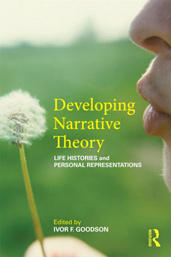Developing Narrative Theory: life histories and personal representation
Narrativity, Learning and Flexibility: towards the narrative future
Commenting on this view, Lifton makes the following point: ‘This conception of self is pre-protean, and has probably not applied for some time in most of the West as well’ (Lifton 1993: 88). He adds: ‘Protean or otherwise the self requires a modicum of inner continuity and of coherence as well, but on its own personal and cultural terms... The sources of coherence can vary. But however elusive and inchoate the effort, all are engaged in it’ (ibid.: 88). Lifton is commenting on the ‘age of fragmentation’ that accompanies the death throes of modernism, a point that Bradbury makes about the modernist institutions and public spaces in which selfhood once sought its endless definition. He says: ‘We feel real and whole, but nothing about our life does, not even the buildings or monuments we set up to spare us this sense of exile, the pain inside modernity’ (Bradbury 2000: 411). The collapse of so many of the meta-narratives and storylines of modernization poses seismic challenges for people’s identity projects and life politics. Richard Sennet has shown in The Corrosion of Character: The Personal Consequences of Work in the New Capitalism (1998) how this new context poses huge challenges for the younger generations. In a sense, they are thrown back into personal spaces and individual life projects as they search for meaning and, enduringly, for some kind of coherence.
Sennett speaks of his own epiphany at the Swiss mountain resort of Davos where, for the last few years, he has attended a winter meeting of the elite of business and political leaders. The World Economic Forum at Davos ‘runs more like a court than a conference. Its monarchs are the heads of big banks or international corporations’ (Sennett 1998: 66). But Sennett finds a dilemma at the heart of the proceedings, namely, that the regime is ‘losing the battle for the hearts and minds’ of ordinary people. In a peculiar and deeply disheartening way, it is almost a rerun of the way that the defeated communist regimes first lost the engagement and commitment of their own people before losing the global battle. Sennett comments:
It therefore seemed to me, as I wandered in and out of the conference halls, weaved through the tangle of limousines and police, or the mountainous village streets, that this regime might at least lose its current hold over the imaginations and sentiments of those down below. (ibid.: 147).
